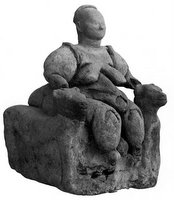 Great debate going on over at WashingtonPost.com, on the Goddess! (Thanks to Medusa Coils for the heads-up on this.) Here's the 2c-worth I threw into the pot:
Great debate going on over at WashingtonPost.com, on the Goddess! (Thanks to Medusa Coils for the heads-up on this.) Here's the 2c-worth I threw into the pot: Wendy,
“Goddess feminists are whistling in the dark when they argue … that everyone used to worship goddesses (some people did, but many did not)….”
Just a tad curious how you know who worshipped what in the past. As an archaeologist I can tell you *we* aren’t certain. One thing we do know, though: thousands of female figurines (but almost no males) have been unearthed in Europe and the Middle East circa 10,000 – 3000 BC. Many are other-worldly – i.e. not dolls, playthings, or porn stuff. A 6000 BC figurine, for example, shows a mammoth nude flanked by two lions, seated on a throne and giving birth. Figurines are often found in temples, on shrines, or mixed among religious paraphernalia.
Another thing we know about 10,000 – 3000 BC: there was no war to speak of. Go get *How War Began,* 2004, by Keith Otterbein, professor of anthropology at SUNY, Buffalo, a director of the well-known Human Relations Area Files, and author of numerous articles on warfare.
Read it.
Here’s the mistake you and most others make about goddesses. They split into two groups. Those after 3000 BC (the date differs by area) are wimpy war-god makeovers. Many before 3000 BC appear to be Great Mother Goddesses.
In a nutshell: After 3000 BC: War gods. Wimpy make-over goddesses. Constant war. Before 3000 BC: Great Goddesses. No war gods. No war.
Go get *The Birth of the Gods and the Origins of Agriculture,* 2002, Cambridge: Cambridge University Press, by archaeologist Jacques Cauvin. Read it.
I'm sure you'll agree we’d all be better off if we stuck with the war gods, the wimpy goddesses, and our constant warfare. Hee, hee.
___________
Thnx to the U. of TX for the pic
thank you for replying to Flaherty. Flaherty has made a name -- and not a good one, I might add -- as a Hindu scholar. In fact, her Freudian, sexed-up and just plain bizarre interpretations of Hindu mythology have offended Indian scholars far and wide. Personally, I think she writes stuff like this not so much because she believes it, but because she believes controversy and put-downs will gain her notoriety as a scholar.
ReplyDelete